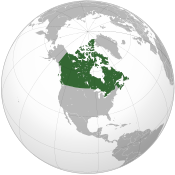Early Canadian federal election set for October 14
Sunday, September 7, 2008
- 13 October 2008: CanadaVOTES: Libertarian John Kittridge in St. Paul's
- 13 October 2008: Canadian scientists protest Harper's attacks on science
- 10 October 2008: CanadaVOTES: NDP candidate Paul Arbour in Carleton—Mississippi Mills
- 10 October 2008: CanadaVOTES: NDP candidate Jo-Anne Boulding in Parry Sound—Muskoka
- 10 October 2008: CanadaVOTES: NDP candidate David Sparrow in Don Valley West
Canadian Prime Minister Stephen Harper has set October 14 as the date for the 40th Canadian federal election. The Prime Minister met with Governor General Michaëlle Jean at her official residence of Rideau Hall today to request that the 39th Parliament of Canada be dissolved. The Queen's representative agreed to drop the writ and hold the election on Harper's recommended date.
Throughout the duration of Harper's minority parliament, there have been several times where an election call had been predicted, but it managed to survive longer than any true minority government in Canadian history, despite having the smallest relative caucus. Nevertheless, today's announcement has been a near-certainty for the past week, and each party has already begun campaigning and putting up signs. The Conservatives began airing TV advertisements before the official election call was made.
After meeting individually with the leaders of the three other parties represented in the House of Commons, Harper said that he does not have confidence in the ability of the Parliament to continue to work. After each of his meetings at 24 Sussex Drive, opposition leaders emerged saying that Harper was intent on calling an election and had already decided that there could be no common ground with opposition parties. Bloc Québécois leader Gilles Duceppe said after his August 29 meeting with the Prime Minister that "instead of making efforts to try finding solutions in the best interest of the population, he wants an election in the best interest of his party". Over the course of this past Parliament, the governing Conservatives rarely found compromises with the other parties, and his small caucus has survived largely because the Liberal Party chose to abstain from crucial bills rather than vote against them.
The move is somewhat unusual. While minority governments rarely last long in Canada a request for the dissolution of Parliament is normally not made until the government is defeated on a motion of confidence by the opposition parties. The move is also unusual because it appears to violate a law passed by Harper himself; Bill C-16 of the first session set fixed election dates for federal elections, reading "each general election must be held on the third Monday of October in the fourth calendar year following polling day for the last general election". Under the law, the next election was not to be held until October 19, 2009; however, the government has stated that the bill was never intended to be used in minority parliaments. Harper argues, however, that the parliament could no longer function and opposition parties intended to defeat the government. With that rationale, Governor General Jean had little choice but to follow her prime minister's advice.
A recent poll conducted by Ipsos Reid for CanWest News Service reported that half of all the 1,003 Canadians surveyed said Harper would make the best Prime Minister, with New Democratic Party leader Jack Layton at 31%, and Liberal Leader Stéphane Dion at 20%. NDP leader Jack Layton is at 38% support for being "sincerely committed to dealing with global warming," with Dion at 30%, and Harper last at 27%. "If this election is going to be a referendum on leadership, Stephen Harper has a heck of an advantage," says Ipsos Reid president Darrell Bricker. He also says Dion has to "to rough up Stephen Harper a bit" if he wants to win the election.
Harper is also at 50% for being the best to lead in tough economic times, 47% for having "what is takes" to lead the country, and 43% for "a vision of Canada that you can support."
The Conservatives currently hold 127 of the 308 seats in the House of Commons, up from 124 at the last election, while the Liberals hold 95 seats, down from 103. Recent polls show the Conservatives polling at 37% support among voters, just below the 40% usually required to form a majority government.
Sources
- Government of Canada. "An Act to amend the Canada Elections Act" — Parliament of Canada, May 3, 2007
- Brian Laghi. "Harper Tories on the brink of majority, poll finds" — The Globe and Mail, September 1, 2008
- CBC News. "Harper determined to call election: Duceppe" — CBCnews.ca, August 29, 2008
- CBC News. "Layton predicts fall election call after meeting with Harper" — CBCnews.ca, August 30, 2008
- CBC News. "Harper to ask GG to set Oct. 14 as election date: sources" — CBCnews.ca, September 1, 2008
- Government of Canada. "Members of the House of Commons" — Library of Parliament, September 1, 2008
- Mike Blanchfield. "Half of Canadians choose Harper as best PM: poll" — National Post, September 2, 2008
- CBC News. "Federal election called for Oct. 14" — CBC News, September 7, 2008
- Patrick Monahan. "The request Jean can't refuse" — Globe and Mail, August 29, 2008




